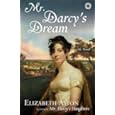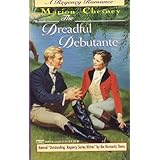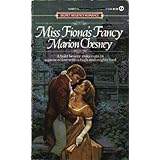What I've Read This Week . . .
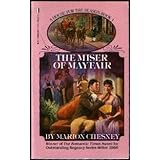
The Miser of Mayfair: A House For the Season 1 by Marion Chesney -- Regency Romance
Another series by Chesney about down-on-their-luck characters. This time, the series revolves around the servants of the town house 67 Clarges Street: the comic butler Rainbird, ladylike housekeeper Mrs. Middleton, wild Scotch cook Angus MacGregor, beautiful Housemaid Alice, Chambermaid Jenny, little Scullery Maid Lizzie and young Pot Boy Dave. The house is said to be cursed and the servants are cheated and blackmailed out of their money by the Duke's wicked agent Palmer and have since become a little family because of the hardships they share. They hope and pray the house will be let and good times will come again. Their prayers are answered when miserly Mr. Jamie Sinclair of Edinburgh, Scotland dies and leaves his beautiful ward to his brother Roderick with no money for her keep. When Mr. Roderick Sinclair realizes he can marry this girl off to the highest bidder, he sells his meager possessions and heads off to London to 67 Clarges Street. A spring storm forces the mail coach to stop at the home of a gentleman, Mr. Pardon, where Mr. Sinclair must protect his sweet but unintelligent ward from their predatory host. Fiona meets the notorious misogynist the Earl of Harrington and charms him with her simple speech and beautiful looks. Once in London, Mr. Sinclair poses as a miser in order to make the ton think Fiona is an heiress. Her looks and reported fortune make her the toast of the town and popular with the gentlemen. However, the only man for Fiona is the Earl of Harrington and she confides her secrets to the amiable butler who helps her win her heart's desire. This book had a darker tone than most of Chesney's other novels. I really couldn't care for any of the characters because they all seemed so stereotypical and two dimensional. The story ends happily and predictably with a dramatic adventure followed by a wedding which resolved the story a little too quickly and neatly. This is not my favorite Chesney novel.
 Plain Jane: A House For the Season 2 by Marion Chesney -- Regency Romance
Plain Jane: A House For the Season 2 by Marion Chesney -- Regency Romance
Poor Jane Hart has the misfortune to be the younger sister of the stunningly beautiful Euphemia who their pushy mother feels will be sure to take the ton by storm during the Season. Jane doesn't mind not having a come out as long as she holds hope of seeing her hero, Lord Tregarthan again. The servants at 67 Clarges street must learn to deal with the tightfisted and bossy Mrs. Hart and get to know her French lady's maid. Jane befriends the servants with her kindness and mild mannered nature and learns the gossip about the house's curse. Soon she becomes involved with solving the murder of the young and beautiful Clara, a previous tenant assisted by Lord Tregarthan, whom Jane is in love with despite his appearance as a fribble. Things aren't always what they seem but Jane is determined to solve the murder and win her love's hand in marriage. The mystery part of the story was a true mystery to me; I didn't figure it out before the plot was revealed. The rest of the story didn't interest me too much. Jane was too sweet and innocent and kind to be interesting and Lord Tregarthan cam across as an empty-headed fashion plate. Jane's family members were awful and her mother and father kind of reminded me of the Bennets in Pride and Prejudice. I will read the rest of the series but it's not as fun as School for Manners.
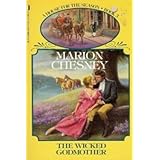
The Wicked Godmother: A House For the Season 3 by Marion Chesney -- Regency Romance
Twenty-five year old country beauty Harriet Metcalf is made godmother to the eighteen-year-old twins of Sir Benjamin Hayner, a neighbor and close friend. Harriet takes the twins off the London for the Season to stay at 67 Clarges Street and hopes to find husbands for the twins. She thinks she's found suitable matches in the Marquess of Huntingdon and his friend, Lord Vere, but the gentlemen may have interest elsewhere that Harriet did not expect, especially since every time she meets the Marquess, disaster lies in the way and quarrels ensue. Harriet can't ignore the strange feelings she has for the Marquess any more than she can ignore the nasty gossip about her spreading around town. She turns to the servants for help and they are only too happy to make things right for the kind and generous tenant they have grown to care for. I liked this book best of the series so far. Harriet was a little too sweet and naive for my tastes, but I liked the Marquess. He was a nicely rounded character with motives behind his rakishness. I also liked how this story stuck mainly to the romance/comedy of manners plot than veering off into an adventure.
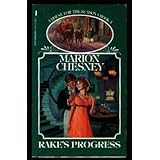
Rake's Progress: A House For the Season 4 by Marion Chesney -- Regency Romance
67 Clarges Street is let for the season by Lord Guy Carlton, who, upon returning from the wars, decides to sample all London has to offer in the way of debauchery. After a wild night of partying, the servants are shocked at their new master's level of dissipation and feel what he needs is a good woman to help him settle down. Help comes in the form of Miss Esther Jones, a strict spinster in charge of two younger siblings. Miss Jones meets Lizzie, the scullery maid, by chance, and learns of Rainbird's school for servants which piques her interest and cultivates her friendship with Rainbird. Miss Jones learns to see servants as more than just appendages to the household and she soon comes to value Rainbird's advice. Rainbird and the servants of 67 Clarges take it upon themselves to thrust their master and Miss Jones together at every opportunity. They also have to deal with their mistrust of Lord Guy's Spanish manservant, Manuel, with unexpected results. Miss Jones is repulsed by Lord Guy at first, but learns to trust his judgment on matters of Society. Soon Miss Jones is launched upon Society and Lord Guy must help her out of trouble with predictable results. This story started off shockingly with Lord Guy and his wild, disgusting party, but he redeemed himself after I learned he was suffering from what we would call PTSD. The story turned me off again at the end when the author chose to include a make out scene and a bedroom scene in which Lord Guy did not act like a gentleman in love and Esther Jones turned missish again. In between the beginning and the end was a good story.

The Adventuress: A House For the Season 5 by Marion Chesney -- Regency Romance
The servants of 67 Clarges Street need one more Season before they can escape and buy the pub they've always dreamed of and hope the very rich Earl of Fleetwood will take the house, however, upon inspection he decides not to take the house. The servants hope for a kind and generous tenant, and fear their hopes are in vain when Miss Emily Goodenough and her uncle move in. Miss Emily seems clutch-fisted and a bit top-lofty, and the servants, fearing they won't earn enough money this Season, try to drive the Goodenoughs away. Unfortunately, their scheme goes awry when Lord Fleetwood shows up to inspect the house again and makes the acquaintance of Miss Goodenough. The servants felt sorry for what they had done when they sense that beneath her tough facade, Miss Goodenough is scared and vulnerable. Helped along by the servants at 67 Clarges and Lord Fleetwood, the Goodenoughs are launched into Society and achieve their wildest dreams, but they have secrets and so does the earl and true love may not be good enough to overcome past prejudices. All comes right in the end and true love prevails. This story is a true romance with real and honest characters who exhibit real human emotions. The last quarter of the book seemed like it was going to go too far off on a wild adventure into cliche land, but it didn't and the ending was very realistic and touching. There was also a bit of humor in this story, which I always enjoy. This is the best of all Chesney's books so far.
 Rainbird's Revegnge: A House For the Season 6 by Marion Chesney -- Regency Romance
Rainbird's Revegnge: A House For the Season 6 by Marion Chesney -- Regency Romance
The servants at 67 Clarges St. dream of getting revenge on the cheating agent Palmer and open their own pub. They have just enough money and need the perfect opportunity to enact their scheme when the Duke of Pelham finally shows up to take residence at the previously forgotten 67 Clarges. Also living on Clarges Street is the beautiful, but vain, Jenny Sutherland, come from the country with her maiden aunt who thinks Jenny lacks town bronze. Jenny feels certain she has only to take her pick from any available gentleman and he'll fall at her feet, however, her hopes for the Season are dashed when the Duke of Pelham takes Jenny in instant dislike for being too sure of herself. Jenny also dislikes the Duke for his haughtiness and sets out to prove that she can easily charm any other man. Meanwhile, the servants at 67 Clarges are changing and growing along with their hopes and dreams. None has the courage to tell any of the others what they really hope will happen in the future and Rainbird must find the perfect opportunity to expose Palmer or they will be chained to servitude forever. Much of the story is dedicated to the servants, leaving little time to develop the characters of Jenny and the Duke (who doesn't seem to have a first name). As a consequence, their story progressed too quickly and ended too neatly. The servants' plot was more interesting but had a bittersweet ending I wasn't expecting. This final volume in the series feels rather flat to be a conclusion and I was a little disapointed.
Overall, this series wasn't as good as School for Manners or even Traveling Matchmaker. It lacked the humor and warmth of the other two and seemed more along the lines of the traditional Regency novels which focus more on adventure than romance.

 cluding fireplace cranes in every fireplace. He also created a well-stocked library. Greene was an avid reader to make up for his lack of formal education. He was an amateur professional architchect and engineer and contributed to much of the design and layout of his home. There is a winter kitchen with a secret staircase leading to the servants' quarters upstairs so that the servants would not be seen in the main hall. The dining room was also situated next to the kitchen so the servants did not have to carry food down the long center hall.
cluding fireplace cranes in every fireplace. He also created a well-stocked library. Greene was an avid reader to make up for his lack of formal education. He was an amateur professional architchect and engineer and contributed to much of the design and layout of his home. There is a winter kitchen with a secret staircase leading to the servants' quarters upstairs so that the servants would not be seen in the main hall. The dining room was also situated next to the kitchen so the servants did not have to carry food down the long center hall.
